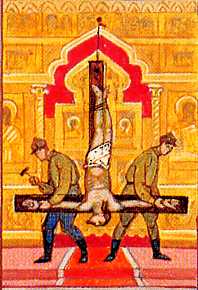Last Saturday, Debra Rienstra looked at the well-known post-Easter story of Jesus and “doubting Thomas,” and the great crescendo at the end of the fourth gospel.
I turn now to the addendum to the John’s Gospel, the 21st chapter (the lectionary passage for this coming Sunday) which contains a verse that might be my “favorite,” certainly the most significant verse to me, and probably my most dreaded Bible verse.
Chapter 21 is mostly known for Jesus’ restoration of Simon Peter. The man who denied Jesus three times is now interrogated three times by the risen Lord. Good stuff. Nice symmetry. But this focus on Peter’s reinstatement often causes us to overlook the ominous words that follow. “Very truly, I tell you, when you were younger, you used to fasten your own belt and to go wherever you wished. But when you grow old, you will stretch out your hands, and someone else will fasten a belt around you and take you where you do not wish to go.” We are told that Jesus’ words to Peter indicated the kind of death he was to die. Tradition says that later in life Peter was crucified upside down, at his own request, believing himself unworthy to die in the same manner as his Lord.
Fifteen years ago Eastertide was one of the darkest and most discouraging times in my life. I had received that terrible phone call telling me that I was not going to be hired for a position I wanted very badly, a “dream job,” the one that felt like a perfect fit.
A freshly minted Ph.D., cobbling together three part-time jobs, I also did a lot of guest preaching around the area. That week, in my pain and turmoil, I was slated to preach. I opened the Bible to read the lectionary passage, John 21. When I came to “But when you grow old, you will stretch out your hands, and someone else will fasten a belt around you and take you where you do not wish to go” the words seared my soul like a branding iron. They still do.
This was Jesus’ message directly to me. My dream was over. That hope was snuffed out. I was being taken where I did not want to go.
After receiving this portentous message, Peter looks over to another disciple and asks Jesus “What about him?” “Is his future as bleak and foreboding as my own?” This other disciple—the one whom Jesus loved—is generally presumed to be John. An interesting kicker, however, suggests that the unnamed, beloved disciple was Lazarus, brother of Mary and Martha, the man Jesus raised from the dead. If that is the case, Peter’s question becomes even more pointed. “Jesus, you give me a death sentence, yet this one, you raised from the dead?”
This too rang so true to my experience. Comparison, bitterness, envy, injustice. What about him? Doesn’t he receive any bad news? Why do others get jobs? Why does that person get the life I had hoped for and worked for?” Jesus’ reply, not especially gentle, “What is it to you? Follow me!”
Six months later, my wounds still oozing, Sophie and I were contacted by the church where we serve as pastors to this day. You might say that what being crucified upside down was to Peter, moving to Pella, Iowa was to us! Of course that is not what I’m saying. I’m not telling you I’m unhappy. But this isn’t what I imagined myself doing when I was younger. In the ministry, in Iowa—it is not what I expected.
I’ve thought about these words of Jesus again recently when two students—bright, conscientious students—did not get into the graduate school they had hoped for. I’m sure many people are attempting console and encourage them. “It will all work out in the end. Into each life a little rain must fall. Keep your chin up. Who knows, this might be a blessing in disguise.” Jesus’ words to Peter have a tougher edge. Could I or should I say to those young students, “Perhaps you are being taken where you do not want to go?”
Jesus is telling all of us, in some way, in some manner, that to be his follower is to be redirected, to be taken to places where you do not want to go. That sounds pretty bleak, pretty tough. And it should.
There is no promise that by following Jesus your dreams will be fulfilled. Your dreams will be changed. And that is almost always painful and disappointing. Our dreams, our desires, our delusions may have to be crucified upside down. Our thought that we can fasten our own belt and go wherever we want, has to be killed, so that we might instead go where Christ leads us. That is solemn and scary news, yet strangely enough I have come believe it is also good news.
Now, when I look at my own life through the lens of Jesus’ words to Peter, I feel an odd ambivalence. Occasionally, when I am robing prior to worship and the cincture rope tightens around my waist, those searing words will still float through my head, “someone else will fasten a belt around you and take you where you do not wish to go.” I may not like it and yet I trust I’ve been taken to where I need to be.

